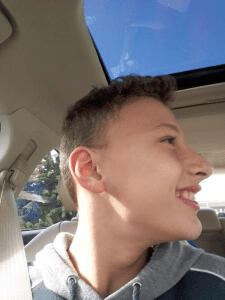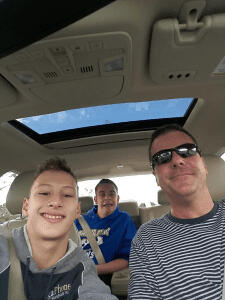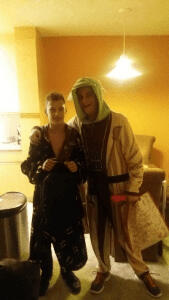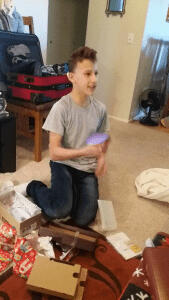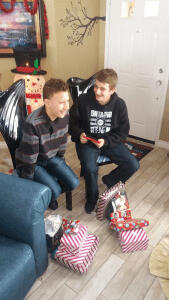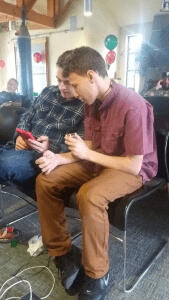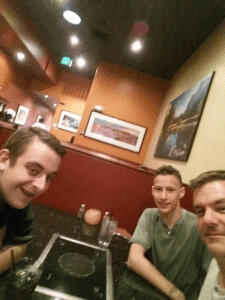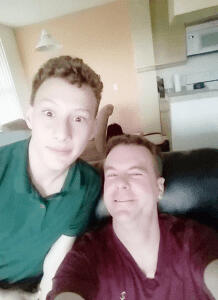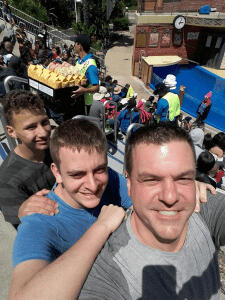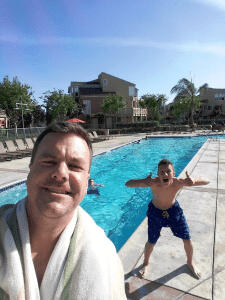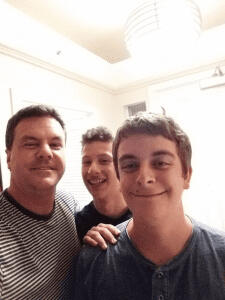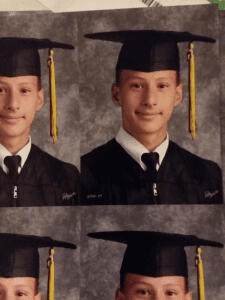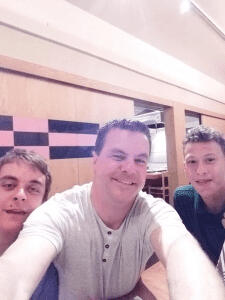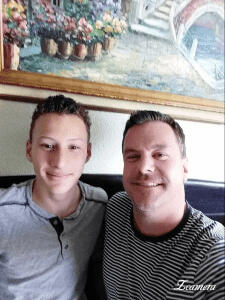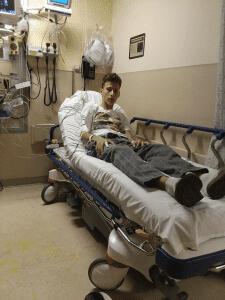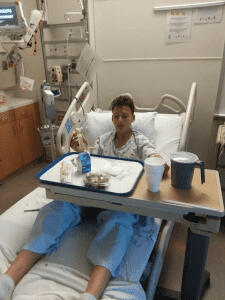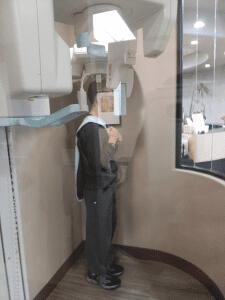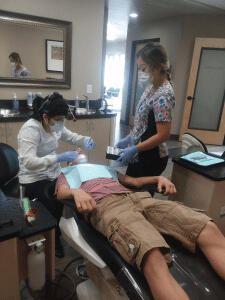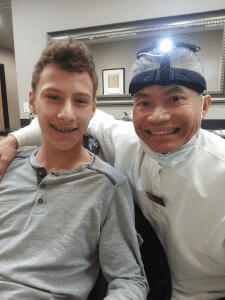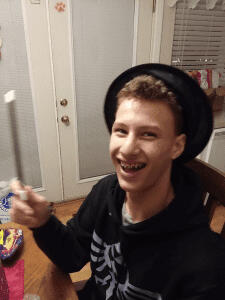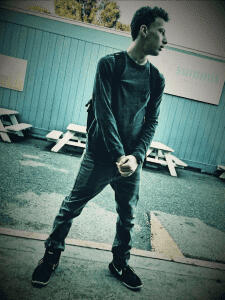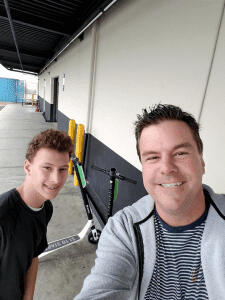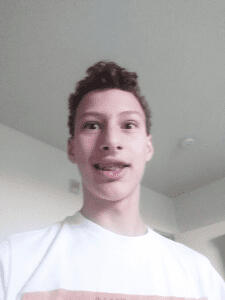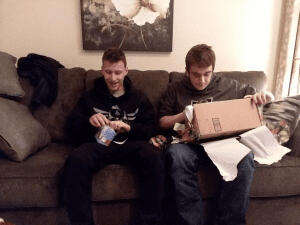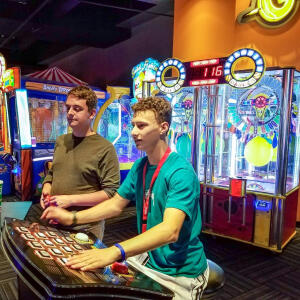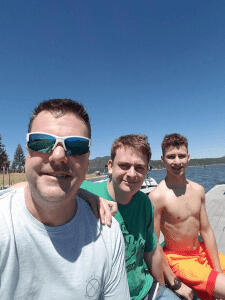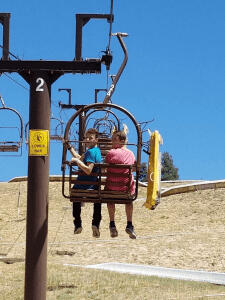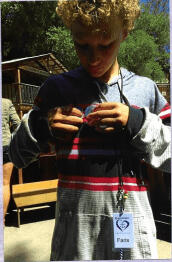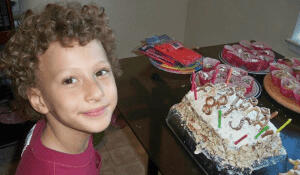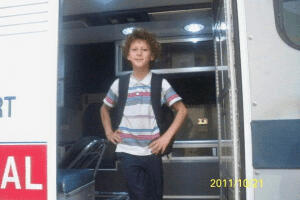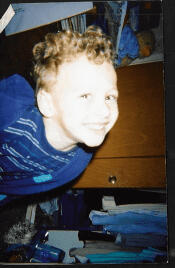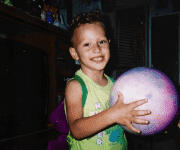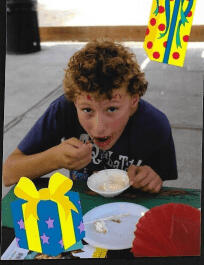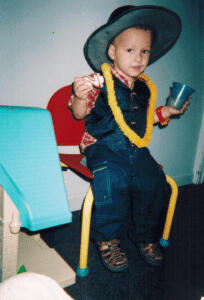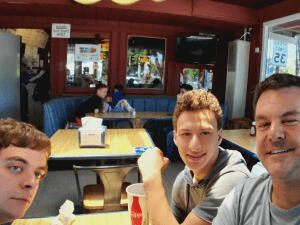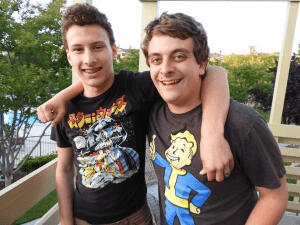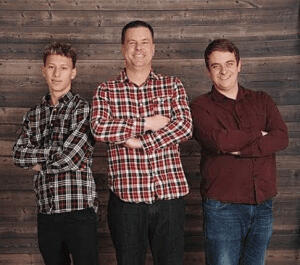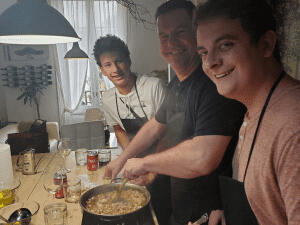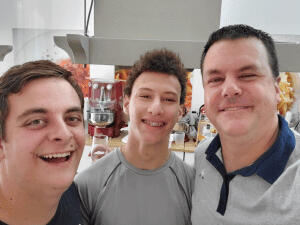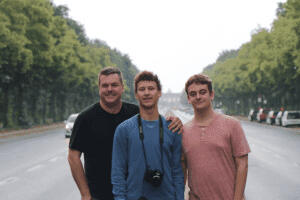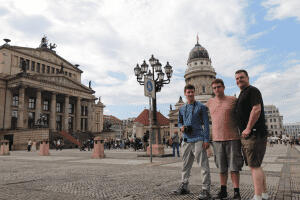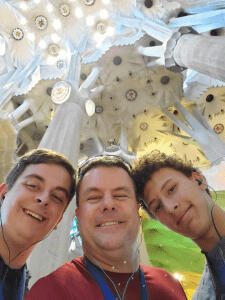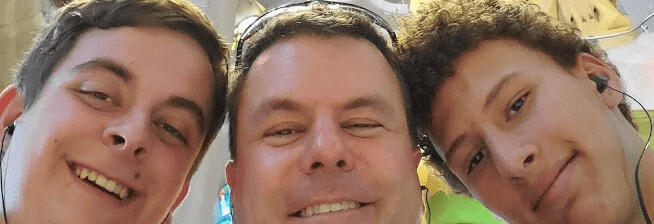
SETTING THE FOUNDATION TO BECOME FARIS'S FOSTER PARENT
My stomach flipped when his twelve-year-old voice said quietly, “I had to steal. You don’t know what it’s like to be starving, with no money, and no one to take care of you.” That moment gutted me.When his father asked me to become his temporary guardian, I was honored—and terrified. As a recently separated single dad, I knew welcoming a foster child into my already complicated life would bring chaos. But I also knew that if I said no, this boy might not make it. And I couldn’t live with that.As a teacher, I believed I could offer stability, guidance, and love—maybe even show him what life could be. What I didn’t know was how much he would end up teaching me. More than both my degrees. More than any other person in my adult life.This extraordinary journey began on Halloween night in 2016, at a Boston Market in San Jose. His father turned to me and asked, “Can you take care of him for a little while? He deserves better.” Months earlier, I’d been part of a Child and Family Services meeting and had been designated an emergency adult caregiver. So when he asked, I didn’t hesitate. I said, “Yes.”As we sat there, his father shared his story—his past as a refugee, his battles with addiction, his regrets. He offered to pay me $300 a month and handed me $20 to buy his son some clothes for the night. And just like that, with nothing but the clothes on his back, our foster journey began.Walking out of that restaurant, Faris turned to me and said, “You know my dad’s never going to pay you, right? And this… this will be forever. I want it to be forever.”I looked at him and said, “I’m good with that.”On the way to Target, he asked for my phone and snapped some goofy, unforgettable photos. Those first silly images captured the start of something neither of us could have predicted—something real, something permanent, something life-changing.
We grabbed a few essentials at Target, including a robe that doubled as his Halloween costume that night. I wanted to spoil him, give him everything he’d been missing—but I couldn’t. I was still finding my footing after starting over on my own just a few months earlier, and money was tight.Back at the apartment, the boys ran off to shoot some hoops while I quietly prepared the space. I made up the trundle bed and tidied the room, trying to process everything that had just happened. Was he a guest? A temporary visitor? Or was this the beginning of something permanent? The weight of it all finally hit me. I paused in the hallway, heart racing, asking myself, "What the heck am I doing?"As the sun dipped below the horizon, I called the boys in to get ready for trick-or-treating. They returned later, bags full of candy and faces flushed with excitement. And just like that, day one of our journey was complete.The next morning, Faris woke me up with a quiet but powerful declaration.
“I think that’s the first time I’ve ever really slept in my entire life,” he said.Still groggy, I asked, “What do you mean?”
He looked down for a second, then said, “I didn’t have to worry about bad things happening in the night… I guess maybe, I feel safe here.”That hit me hard. I’ve struggled with insomnia for years, but I couldn’t begin to imagine what it meant to be twelve and always sleeping with one eye open. He was curled up on a narrow trundle mattress I thought might be too stiff, too small—but to him, it was a safe place. That was enough.Each morning after that, he woke up with a light in his eyes—curious, energized, asking what the day would bring. There was a joy to him that started to shine through, little by little.The months ahead would bring both beautiful, joy-filled holidays and waves of fear and uncertainty—but in that moment, it felt like we had something steady to hold onto: the quiet, miraculous comfort of feeling safe.
Being a naturally humble person, I didn’t tell many people what had happened. I shared Faris’s new living situation with my family—most of whom gently (and not so gently) questioned whether I was in over my head—and with my best friend, who offered unwavering support.As expected, the financial support his father had promised never came, and the strain quickly became real. With the holidays approaching and our household still just having the basics, I posted our story on GoFundMe, hoping to raise a little money for some household essentials and Christmas presents.To my surprise, the campaign—now long since taken down—went viral. In a matter of days, it raised several thousand dollars. The kindness of strangers and the generosity of friends, both old and new, helped us turn what could have been a bleak holiday into one full of warmth, hope, and joy.
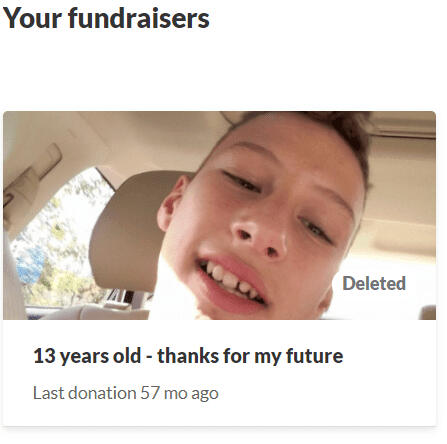
The Holidays
I was determined that we would celebrate Christmas surrounded by family. So, we packed up the car and made the long drive from Northern to Southern California, where most of my relatives lived.By then, communication from Faris’s parents had dwindled to almost nothing. With each passing day, it became more and more apparent: Faris wasn’t just a temporary part of my life—he was becoming family.During the holiday gatherings, I caught myself introducing him as “my kid.” It wasn’t legally true—I was still just his temporary guardian—but emotionally, it felt undeniable. He had found a place in my heart that I hadn’t expected, and my son clearly felt the same. They referred to each other as brothers without hesitation.Somewhere along the drive down, Faris looked out the window and said quietly, “I’ve never celebrated Christmas. I’m not sure if it was because my dad is Muslim… or because he just didn’t have the money.”I didn’t know how to respond. Part of me was stunned—How could he have never celebrated Christmas? Was he being serious?—but looking at his face, I knew he was telling the truth.When Christmas morning arrived, my family didn’t miss a beat. They were absolute troopers—every single one of them had picked out thoughtful gifts for Faris, treating him as if he had always been part of the family. He followed my son and me from house to house, meal to meal, celebration to celebration, trying his best to blend in and not feel like an outsider or “just a foster kid.”He unwrapped each gift with quiet excitement, his face lighting up in a way I hadn’t seen before. But the moment that truly stayed with me was when he turned to me and asked, “Is this what having a family feels like?”After a few questions, I realized that—aside from sporadic time with his mom or dad—he hadn’t really experienced a sense of family at all. There had been a brief period when his grandfather and step-grandmother fostered him, but beyond that, the concept of “family” was mostly a mystery to him.That Christmas, it started becoming real for both of us: this wasn’t just a temporary arrangement. This was the beginning of something lasting.
It felt surreal—almost as if Faris had always been part of our family. His joy was contagious, and his presence filled the house with a light I didn’t realize had been missing. As his foster parent, I felt needed, trusted—important in a way that was both humbling and profound.Heading into 2017, I hoped for stability—for all of us. I wanted to create a steady, safe environment where Faris could begin to heal and grow. But once he began opening up about his past, the weight of what he’d been through hit me hard.During our many late-night conversations, he gradually revealed pieces of his story—moments that left me silent, my heart sinking. Yet through it all, he remained fiercely protective of his parents. “I don’t ever want to say anything that gets my mom or dad in trouble,” he told me once. “No matter what happened, I don’t want them arrested.”That’s a boundary I’ve chosen to honor. As I continue telling this story, I’ll respect his wish to keep certain details private.Still, the truths he did share were heavy. Sometimes, overwhelmingly so. I encouraged him to speak with a counselor—someone professionally trained to help him carry the emotional weight—but he resisted. “I don’t trust counselors,” he said. “I only want to tell you.”So I listened. I became his sounding board, his witness. And more often than not, I found myself in awe—not just of his resilience, but of his emotional intelligence, his insight, his ability to keep moving forward.Throughout the first part of 2017, Faris, my son Elijah, and I continued living as a family. Day by day, we built something strong and real. And with each passing week, it became more painfully clear: Faris had endured more than most people could imagine—more than any child ever should.
A New Year Brings More
At one point, I asked Faris to take the ACE (Adverse Childhood Experiences) evaluation online. When his score came back as 9 out of 10, and he assured me he had answered every question honestly—which, after many more heartfelt conversations, I came to believe without a doubt—I grew deeply concerned for his long-term well-being.Not long after, a tense and emotional phone call with his father left Faris visibly shaken. He came to me afterward and said with a shaky voice, “He can’t be in charge of this anymore. You need to adopt me or something. I just… I can’t keep living in fear that he’ll show up one day and take me away.”It was a heavy moment. Under our existing arrangement, his father still held full legal custody and could, at any time, reclaim physical custody of Faris. From everything I had observed—and from what Faris had shared—it was clear that this instability was taking a serious emotional toll on him.In response, I reached out to LACY (Legal Advocates for Children & Youth), a local organization known for supporting youth in vulnerable situations. As it turned out, they were already familiar with Faris and had previously assisted with placement efforts. Within a month, LACY assembled a legal team and scheduled an initial consultation.After meeting with Faris and hearing his story, they invited me to join the process and asked if I would consider becoming his court-appointed legal guardian. Guardianship, they explained, would not only grant me legal authority to care for Faris but also open the door to financial resources and long-term stability—essential steps for his future.We both agreed it was the right move. Faris returned to their office shortly after and officially appointed them as his legal representatives—something they generously offered to do at no cost.Things finally began to feel like they were moving in the right direction. That summer, it felt like we were all preparing for a fresh start.I was stepping into a new teaching role while learning to navigate single life with teenage kids. Elijah was adjusting to the rhythm of shared custody and doing his best to stay grounded in school. And Faris—perhaps for the first time—was about to start high school with a fragile but growing sense of stability. A new chapter was beginning for all of us.
Diabetes Joins His Life Forever
Toward the end of summer, everything came to a screeching halt.“Roger, I think I’m dying,” Faris said one day, his voice low and serious. “Something is really wrong.”At first, I brushed it off. I figured it was puberty—growing pains, a changing body, hormones. But something about his energy was off. This was Faris, after all—normally buzzing with life, bouncing off walls, constantly on the move. Now he was sluggish, pale, and uncharacteristically quiet.Then I noticed something that stopped me cold. While cleaning up the bathroom, I found urine on the floor—and it was thick, almost syrupy. That set off alarms. I started researching symptoms, and diabetes came up again and again.I figured out how to get him seen by a doctor covered through Medi-Cal, and we made an appointment. The physician initially echoed my assumption: most likely puberty. Still, after hearing my concerns—and especially after I described the sugary urine—she decided to run a full panel of blood tests, including a glucose test.The next morning, I got a call that changed everything.“Take Faris to the emergency room now,” the doctor said, urgency in her voice. “His blood glucose is 1400. He’s likely just moments away from slipping into a coma.”Everything blurred after that.We rushed to the ER, both of us in a state of shock. I kept thinking how close we’d come to missing this—to brushing it off just a little too long. I didn’t know it then, but Faris’s life was about to change forever.
I’ve been scared before—but nothing compared to the fear I felt that day in the ER.The moment we walked in and I mentioned Faris’s blood glucose level, they rushed him back within minutes. It was no longer a concern; it was a crisis. The staff moved with urgency, calling it a life-threatening emergency. My heart raced as I followed them through the doors, trying to stay composed for Faris’s sake.Thankfully, the hospital staff was incredible. They kept me informed every step of the way, working hard to keep Faris as calm and comfortable as possible. After a series of tests, the doctors broke the news: Faris had type 1 diabetes. It wasn’t temporary. It wasn’t manageable with just diet. He would need to take insulin injections for the rest of his life.My concern immediately shifted from his physical health to his emotional well-being. After everything he’d already endured, I wasn’t sure how this news would land. I pulled him aside and asked gently if he truly understood what this diagnosis meant.He looked at me, calm and steady, and said, “I’ve got this. I’ve been through a lot worse. I’m just glad you were the one taking care of me—because if it wasn’t for you, I’d be dead.”That hit me like a punch to the chest.We spent nearly a week in the hospital. During that time, the doctors and nurses trained both of us in managing his condition—how to monitor his blood sugar, administer insulin, and respond in case of an emergency. I learned how to identify warning signs, calculate doses, and determine exactly when to call for help. It was overwhelming, but we both stayed focused. Faris approached it with grit and grace beyond his years.Faris’s legal team was informed right away. The moment they learned of his diagnosis, they filed an emergency motion for custody, allowing me to make medical decisions on his behalf. They also worked to expedite the guardianship process, moving the court date up to ensure he wouldn’t face this new reality without legal protection and stability.Despite everything, life kept moving forward. Faris started high school, insulin pen in hand, trying to adjust to yet another new normal. We juggled doctor appointments and multiple court hearings about his guardianship, navigating the chaos together—just trying to keep life on track one day at a time.
Guardianship on the Horizon
As the final guardianship hearing drew near, Faris brought up something he’d been quietly wishing for: braces.He said it casually at first, but I could tell it meant a lot to him. After all he’d been through, this wasn’t just about straightening teeth—it was about confidence, about finally feeling good in his own skin. We talked about the cost, and I suggested he consider telling his story through another GoFundMe campaign. Maybe, just maybe, the community that had rallied behind him once would show up again.And they did—beautifully.Within weeks, Faris had raised enough to cover the entire cost of his braces. The support flooded in, not just in donations, but in words of encouragement, pride, and love. It was another reminder of how many people believed in him.Shortly after the campaign’s success, we arrived at the day we’d been waiting for.In the first week of November 2017, the probate court issued its final ruling: I was now Faris’s legal guardian. With that order, I was granted full parental rights and decision-making authority. But more than that, Faris finally had what he’d longed for—a forever home.He was ecstatic. I’ll never forget the way his face lit up when the decision was announced. After years of instability and uncertainty, he finally had something solid to stand on.We didn’t waste any time. I began the process of applying for financial support to help with his ongoing care, and we scheduled an appointment with our favorite orthodontist, Dr. Tran at Braces 2000. He had done excellent work on my son Elijah’s braces, but more than that, he had been a quiet champion of Faris’s journey—offering encouragement and even some financial help along the way.It felt like everything was beginning to fall into place. Faris had a new smile on the horizon and, more importantly, a permanent place to call home.
Getting Used to Diabetes and Braces
Faris, Elijah, and I pressed on, and for the most part, the rest of the school year brought a sense of stability. But behind that surface calm, there were many sleepless nights and hidden battles—especially when it came to managing Faris’s diabetes.More than once, I found myself calling in sick to work after long, exhausting nights. Faris’s blood sugar would sometimes crash while he was sleeping, a dangerous condition known as hypoglycemia—something I’d learned could be fatal if not caught in time.Thankfully, he wore a high-tech device called a Dexcom, a continuous glucose monitor that tracked his blood sugar in real time. If his levels dropped too low, the device would sound an alarm. The problem? Faris slept like a rock—completely unfazed by the alerts. So when that high-pitched alarm pierced through the silence of the night, it was me who jumped up, heart pounding, to check on him and administer whatever he needed.Sometimes it happened once a night. Other times, multiple alarms would go off, and I’d be up and down like a yo-yo. I was constantly running on empty.By morning, the thought of teaching a room full of 25 energetic kindergarteners felt nearly impossible. The exhaustion caught up with me, and my reliability at work began to slip. I could feel the shift—the looks, the silence. I got the distinct sense that my boss wasn’t pleased, and it started to take a toll on my professional reputation.Still, we made it.Faris completed 9th grade, learning to manage a chronic illness while adjusting to a new school and a new life. Elijah wrapped up 11th grade with focus and grace, balancing his own transitions between two homes. And I—despite the fatigue, the doubts, and the late-night alarms—finished another school year in the classroom.We had survived another chapter, and we were still standing. Together.
Making a Move
As summer approached, we looked forward to some well-earned vacations, but there was more on the horizon than just time away. With the financial assistance from the county finally giving us some breathing room, we decided it was time to upgrade our living situation.We'd outgrown our small, cramped one-bedroom apartment. The boys had been sharing a living room for far too long, and I knew it was time for a change. We found a much larger townhouse within the same apartment complex—a three-story home with two spacious bedrooms, a dedicated living room, and enough space for all of us to spread out and breathe.It felt like a fresh start, a tangible sign that we were building something more stable. The boys would finally have their own room. It wasn’t just a bigger apartment—it was a symbol of how far we had come.But before the move, we took a much-needed family vacation to Southern California. It was a chance to relax, recharge, and reconnect before diving into the chaos of moving. We spent time with family, enjoyed the warm sunshine, and created memories that would carry us through the busy months ahead.When we returned, the real work began. The move was exhausting, but exciting. We packed up our old life, carefully wrapping up the memories of the past and carrying them into our new home. By the time the school year rolled around, we were settled into our new space—a new chapter, ready to begin.
After multiple conversations with my employer, I made the difficult decision to resign from my job. It wasn’t an easy choice, but it felt like the right one for our family’s future. A few weeks later, I was hired to teach at Faris’s high school—an opportunity that felt both exciting and serendipitous, as it allowed me to be even more present for him.Both Elijah and Faris started the school year strong. Elijah, now a senior, was finding his footing as he prepared to close out his high school years, while Faris stepped into 10th grade with more stability than he’d ever had before.Around this time, something unexpected happened—Faris’s aunt, who lived in France, discovered that Faris was in my care. At first, she was deeply troubled that her nephew wasn’t living with his parents, but after learning about his journey, she quickly became supportive. More than that, she wanted to help Faris find success and stability in his life.As we communicated more, I started to see Faris in a new light. He’d been shuffled between so many foster families, relatives, and unstable environments in his life that trusting anyone—let alone believing that they might be permanent—was a difficult hurdle for him. I noticed how he approached relationships with a kind of detachment, as if everyone was disposable. And while I understood it, it scared me to my core.I had treated Faris like my son, loved him like my own, and the thought that one day he could just "dispose" of me, too—that I might vanish as easily as all the other people in his life—was a constant, silent worry.But I wasn’t giving up. I was determined to help Faris form real connections, ones that didn’t end in abandonment. His aunt, now part of this journey, seemed like an important step in that direction. She was stable, caring, and truly wanted to be there for him. I wanted to foster that relationship, to show Faris that not all family is fleeting.We didn’t have much from his past, just bits and pieces. But then, his aunt shared something incredible—a photo album that brought his childhood to life. In those pages were glimpses of a younger Faris, moments filled with love and joy, a stark contrast to the life he’d known. Seeing him through those pictures was like discovering a new layer to his story—one that showed a different side of him, one he could still hold on to.
Childhood Memories
Looking through those photos, I was struck by something I hadn’t fully realized before: Faris’s smile had always been a constant, even in the most difficult of circumstances. In every picture, no matter the situation, his smile was there—contagious, infectious, full of life. It was the same smile he wore when he was with me. Even when the doctor told him that he would have to take insulin shots for the rest of his life, Faris still smiled, as if nothing could take away his joy.Knowing what I did about his past—the hardships, the uncertainty, the pain—it struck me even more how remarkable his spirit was. The situations he had faced, the ones that were completely beyond his control, were almost unfathomable. Yet, despite everything, Faris continued to radiate positivity. His smile wasn’t just a reflex; it was a testament to his resilience, his ability to find light in the darkest of moments.He never ceased to amaze me. Here was a young boy who had been through more than most adults I knew, yet he approached life with a strength and optimism that I couldn’t help but admire.At that moment, I realized something: Faris wasn’t just staying with me—he was a part of my family, unquestionably and without a doubt. And we were moving forward together.
Europe Here We Come!
Teaching at Faris’s high school was an incredible experience, and it felt like we had settled into a rhythm—school year after school year, with the bond between us growing stronger all the while. Then, just like that, the 2018-2019 school year came to a close, and we found ourselves on the cusp of another summer break.In February, I began planning something extraordinary: a trip to Europe. I had never been, but I had friends who lived in Germany and a vacation house in Spain, so the opportunity was too good to pass up. More than just an adventure, I saw this as a perfect chance for Faris to connect with his aunt—the woman who had shown such interest in his life and who had become a source of stability for him. It felt like the right moment for all of us to explore new horizons, both literally and figuratively.As an avid traveler, I had taken the boys on many domestic trips, but this would be our first time leaving the United States. The excitement was palpable. We spent 26 unforgettable days together, exploring seven countries—each stop more incredible than the last. Our journey took us from the United States to Spain, Germany, the Netherlands, Vatican City, Italy, and the Czech Republic. Every new city we visited was an opportunity to deepen our connection, share new experiences, and see the world through Faris’s eyes.This wasn’t just a trip; it was a milestone in our journey as a family. For Faris, it was a chance to see the world beyond the confines of his past, to step into a future full of possibilities, and to build memories that would last a lifetime.

